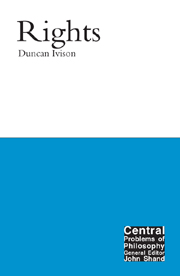Introduction
Summary
The aim of this book is to explore different arguments about rights in the context of various rich languages of moral and political philosophy. Locating rights in the midst of moral and political argument is crucial. Rights are often appealed to as part of a vision of the individual as radically disengaged from thick ethical theories that bind her to particular social roles or hierarchies. The idea of rights as providing a boundary around the individual, or at least around certain crucial aspects of her freedom, has been an influential image in the history of political thought. The image is true and powerful, but the conceptions of freedom and obligation that shape it are themselves the product of a particular set of moral claims. Boundaries abound in our talk about rights. But boundaries are also often ambiguous: they include as they exclude; they rule in as much as they rule out; and they stake out relationships as much as they separate.
Lawyers and moral philosophers frequently argue over the ultimate parentage of the concept of rights. But in this book, I shall be trying a different tack. I shall be focusing instead on the unavoidable political character of rights: the way arguments about rights are characterized by disagreement and conflict and by movement between the moral and the legal, and the abstract and the practical. It is a mistake to think that rights are either primarily a moral or legal concept.
- Type
- Chapter
- Information
- Rights , pp. 1 - 16Publisher: Acumen PublishingPrint publication year: 2007

